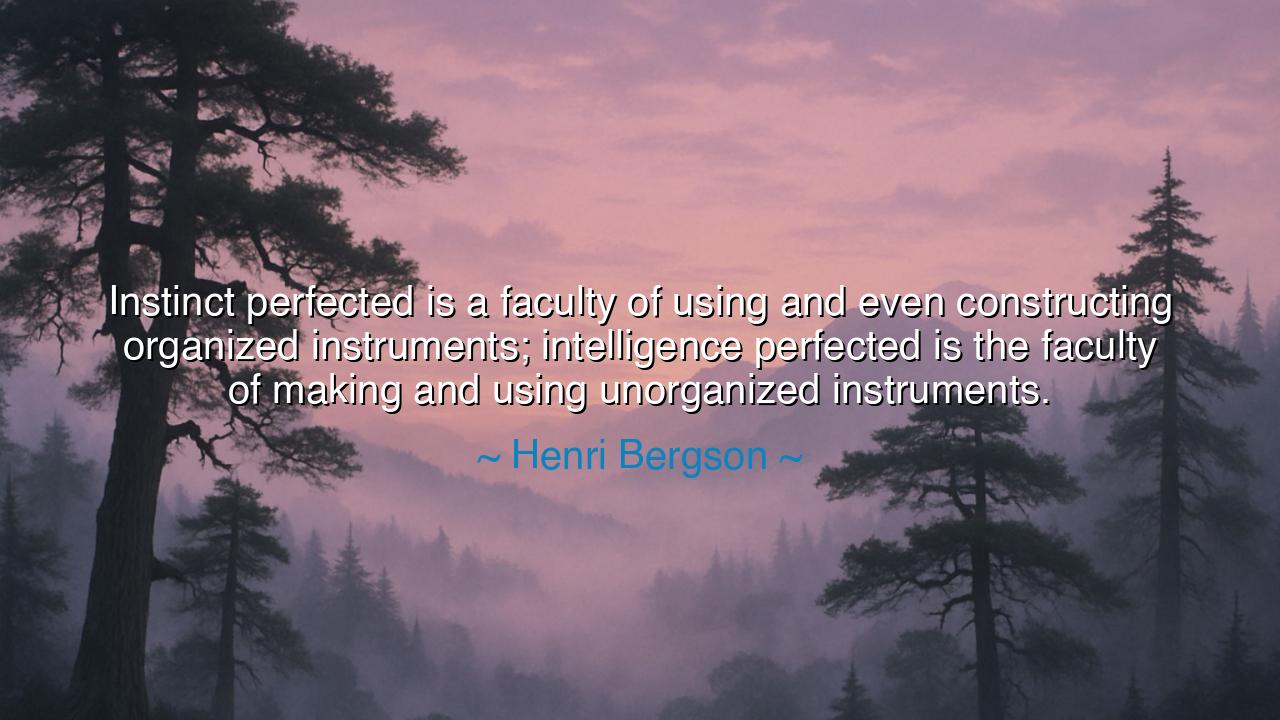
Instinct perfected is a faculty of using and even constructing
Instinct perfected is a faculty of using and even constructing organized instruments; intelligence perfected is the faculty of making and using unorganized instruments.






In the profound and visionary words of Henri Bergson, the French philosopher of life and motion, we encounter this meditation on the nature of mind and creation: “Instinct perfected is a faculty of using and even constructing organized instruments; intelligence perfected is the faculty of making and using unorganized instruments.” These words, drawn from his masterpiece Creative Evolution (1907), reach beyond philosophy into the very essence of what it means to be alive, to adapt, and to create. Bergson, a thinker who sought to understand the pulse of life itself, contrasts instinct and intelligence as two divine flames—different in form, yet born of the same cosmic fire.
To understand the origin of this quote, we must return to Bergson’s lifelong quest to reconcile the mechanical with the mystical, the scientific with the spiritual. He observed that throughout nature, life expresses itself through two intertwined powers: the instinct, found in the living beings who act through inherited wisdom, and the intelligence, which belongs most fully to humankind, allowing us to manipulate the world beyond the boundaries of nature’s design. In his vision, these are not opposites, but two paths the élan vital—the vital impulse of life—has taken in its journey toward consciousness and freedom.
When Bergson speaks of instinct perfected, he points to the extraordinary natural genius of creatures who act with precision and harmony, guided not by reason, but by the deep, unconscious wisdom of life itself. Consider the bee, building its honeycomb with mathematical perfection, or the bird, crafting its nest without a lesson or plan. These beings, through instinct, wield tools and techniques so refined they seem divinely inspired. Their instruments—hives, webs, shells—are organized, born from within the living order of their own nature. They create as extensions of their bodies, their instincts, their species. Their perfection is not invention but union: they are one with what they make.
By contrast, intelligence perfected, Bergson tells us, is the power to create from that which is unorganized, to shape the raw matter of the world into meaning and purpose. Humanity’s greatness, and also its peril, lies in this very power. The spider spins from its body, but man spins from his mind. We take the unshaped—stone, wood, metal, and now code—and forge it into tools, machines, civilizations. The human hand, guided by the intellect, can transform dust into a temple, chaos into order. Yet in doing so, we step apart from nature’s harmony; we stand as architects rather than participants. This is both our triumph and our exile.
Consider the story of Leonardo da Vinci, that living flame of intelligence perfected. From pigments and oil, he summoned the living soul of humanity upon the walls of cathedrals; from wood and gears, he imagined flight centuries before its time. Leonardo was not moved by instinct; his creations did not arise from inheritance or habit. They came from conscious invention—the faculty of making and using unorganized instruments. He gazed upon the world not as it was, but as it could be, and in that act, he embodied the freedom Bergson ascribed to human intelligence. For where instinct continues the rhythm of life, intelligence begins a new melody of its own making.
Yet in this difference lies a lesson. The perfection of instinct shows us the beauty of harmony with life; the perfection of intelligence shows us the power of transformation. But if intelligence grows without wisdom—if it forgets the sacred balance from which instinct springs—it becomes destruction rather than creation. The tools that build can also break; the same hand that shapes art can forge weapons. Thus, Bergson’s words remind us: the highest form of intelligence is not mere invention, but creative empathy, the power to unite freedom with purpose, reason with reverence for life.
Therefore, O seeker of wisdom, learn from both paths. Cultivate your instinct, the quiet intuition that senses truth beyond reason; and hone your intelligence, the radiant faculty that transforms thought into form. When you act, let instinct ground you in life’s natural rhythm, but let intelligence lift you toward creation. Build not only with hands, but with heart. Use your tools not merely to master the world, but to serve it—to shape it in ways that reflect the divine order from which both instinct and intelligence arise.
For in the end, as Bergson foresaw, the true perfection of the human spirit lies not in instinct alone, nor in intelligence alone, but in their union—in the harmony between the inherited wisdom of nature and the inventive fire of reason. When these two forces work together, the human being becomes more than maker or creature; he becomes a co-creator with life itself, continuing the eternal act of creation that began before the dawn of time.






AAdministratorAdministrator
Welcome, honored guests. Please leave a comment, we will respond soon